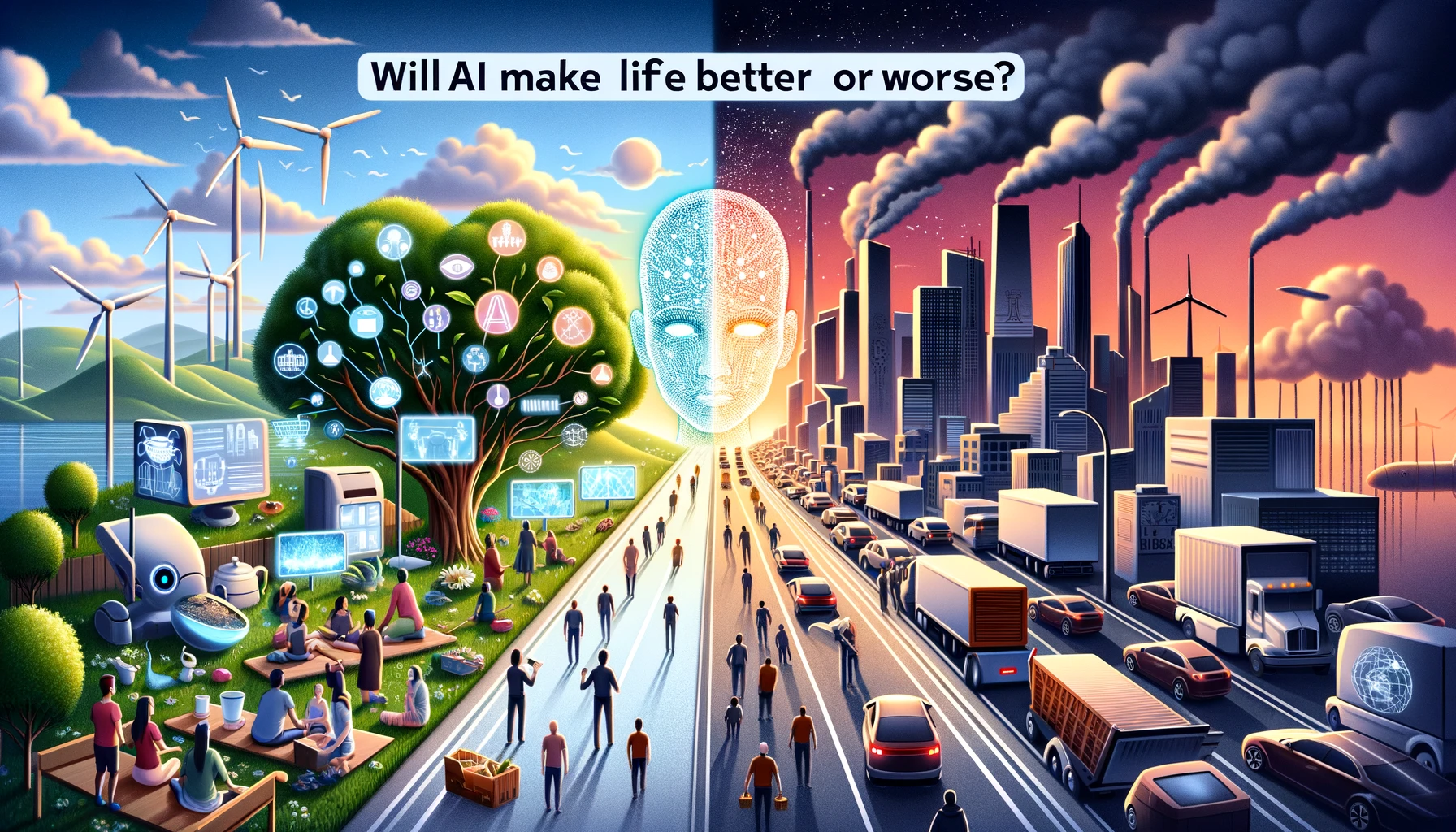As we stand on the precipice of a technological revolution, the question on everyone’s mind is: Will AI make life better or worse? This debate rages on, with visions of a future where machines liberate us from menial tasks contrasting sharply with dystopian images of job displacement and loss of privacy. The truth likely lies somewhere in between, and as an experienced blog writer, I’m here to explore the multifaceted impact of Artificial Intelligence on our lives. From healthcare advancements to potential ethical dilemmas, join me in unraveling the complex tapestry of AI’s role in our future. Will it be the harbinger of unprecedented improvements or the catalyst for unforeseen challenges? Let’s dive into the heart of this pivotal topic.
Table of Contents
Introduction
When we ponder the question, Will AI make life better or worse?, we’re essentially asking about the trade-offs between convenience and control. Artificial Intelligence, or AI, has already begun to infiltrate every aspect of our lives, from the way we shop to how we interact with our homes. But what does this mean for our future?
“The potential for AI to enhance our lives is as great as its potential to disrupt them.” – Anonymous
AI’s capacity to process vast amounts of data and learn from it means that it can improve efficiency, reduce human error, and even make predictions about future events. But with great power comes great responsibility, and the ethical considerations of AI’s influence cannot be ignored.
Let’s unpack the layers of this complex issue:
- How AI is currently being used in various sectors
- The potential benefits and drawbacks of widespread AI adoption
- Strategies for ensuring that AI development aligns with human values
As we delve into the world of AI, it’s essential to keep an open mind and consider all perspectives. After all, the future of AI is not just about technology; it’s about how we choose to integrate it into our society.
The Pros of AI: Enhancing Quality of Life
When we ask ourselves, Will AI make life better or worse?, it’s crucial to start by looking at the benefits AI has to offer. The advancements in AI technology promise to revolutionize the way we live by making our daily routines more efficient, our jobs easier, and even improving our health.
Healthcare Breakthroughs
AI’s impact on healthcare is nothing short of miraculous. With its ability to analyze medical data and provide personalized treatment plans, AI is on the frontline of battling diseases and saving lives. Here’s a quick rundown:
| AI Application | Benefits |
|---|---|
| Predictive Analytics | Forecasts patient outcomes to improve care. |
| Drug Discovery | Speeds up the development of new medications. |
| Robotic Surgery | Enhances precision and reduces recovery times. |
Smart Cities and Sustainability
AI is also paving the way for smart cities, optimizing everything from traffic flow to energy consumption. This not only makes urban living more bearable but also contributes to a greener planet.
- Intelligent traffic systems reduce congestion and pollution.
- AI-powered grids distribute electricity more efficiently.
- Waste management becomes smarter and less wasteful.
But that’s just the tip of the iceberg. The potential applications of AI are as vast as our imaginations, and the promise of a better quality of life is an enticing one. Yet, as with any powerful tool, there are risks and challenges to consider.
The Cons of AI: Ethical and Social Implications
The flip side of the coin asks a sobering question: Will AI make life better or worse? in terms of its ethical and social implications. The rapid advancement of AI technology brings with it a host of concerns that we must address to prevent potential negative outcomes.
Job Market Disruption
One of the most contentious issues is the impact of AI on employment. Automation has the potential to displace a significant number of jobs, particularly in sectors like manufacturing and transportation. This shift could lead to economic instability and increased inequality if not managed properly.
“AI doesn’t have to spell the end of the human workforce, but it requires a rethinking of our labor market strategies.” – Tech Analyst
It’s not all doom and gloom, though. AI could also create new job opportunities in fields like AI maintenance, programming, and ethics. The key will be in preparing the workforce for these changes.
Privacy Concerns
As AI systems become more integrated into our lives, they collect vast amounts of data about our behaviors and preferences. This data can be used to improve services but also raises serious privacy concerns. How do we ensure that our personal information remains secure and isn’t used for nefarious purposes?
- Stricter data protection laws may be required.
- Greater transparency from companies on how AI uses data.
- Public education on digital literacy and privacy rights.
In conclusion, while AI has the potential to make life better in many ways, we must be vigilant about the ethical and social implications it brings. By engaging in open dialogue and proactive policy-making, we can steer AI development in a direction that benefits all of society.

Leave a Reply